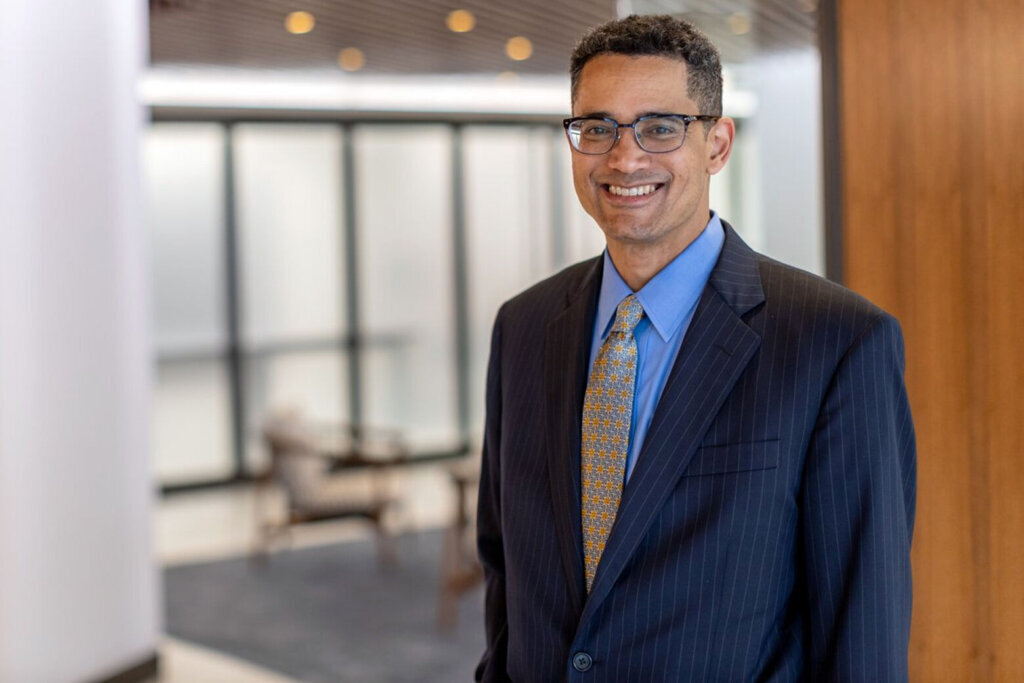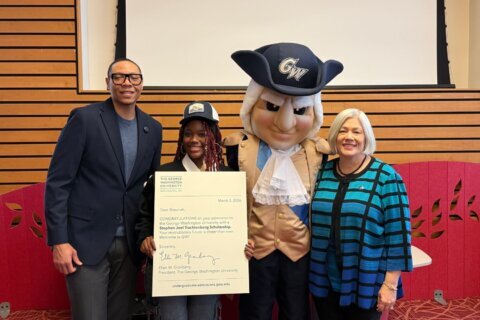This video is no longer available.
Karl Racine — the District’s first elected attorney general — isn’t running for reelection this year. Three Democrats are vying for the vote in D.C.’s June 21 primary: Ryan Jones, Brian Schwalb and Bruce Spiva.
Bruce Spiva is a longtime D.C. lawyer with 30 years under his belt who has advocated for civil rights, consumer protection, antitrust enforcement, housing and criminal justice reform. He also challenged council member Kenyan McDuffie’s ability to run in the race, which saw the Ward 5 candidate ruled ineligible.
He spoke with WTOP’s Mike Murillo about the issues in this year’s race.
Editor’s note: This interview has been edited for clarity.
- Meet the candidates for DC attorney general and mayor
- DC primary voter guide
- Local Politics and Elections News
- More DC News

Who is Bruce Spiva?
I’ve been practicing law for 30 years — the reunion that I missed a few days ago was my 30th reunion — practicing in the areas of civil rights, consumer protection, fighting for voting rights and housing justice, as well as commercial litigation.
Before I left to run for office, I was the managing partner of the D.C. Office of Perkins Coie, a large national law firm, and I also was a member of the firm’s executive committee, which is the governing body of the firm that has over 1,200 lawyers and about a billion dollars in revenue.
I’m running because I really want to try to use the experience that I’ve had to try to help people, particularly low-income folks — folks who’ve been left out and left behind.
Why he’s the best person for the job
One, I think that the breadth and depth of my public interest litigation experience, having litigated many cases involving civil rights, housing discrimination, fighting for tenants in Columbia Heights who had been pushed out of their housing by slumlords who had deliberately allowed their properties to go down, fighting for issues such as D.C. statehood — I’ve done that in and out of the courtroom.
I am the only candidate who has actually been arrested in an act of civil disobedience — I hasten to add, fighting for statehood, which I think is an important issue and in addition to being morally correct, it has a lot of practical impact on many aspects of our city and of the job of the attorney general.
I also have the management experience to be an effective leader of this office of over 700 professionals and almost 350 attorneys, with 11 different divisions, spanning everything from zoning, to housing, to antitrust consumer protection. Many of those areas are areas that I have actually practiced in myself.
Combating crime
The D.C. attorney general only has jurisdiction over juvenile crime; the office does not have jurisdiction over adult felonies. I think that is something that needs to change; we should have jurisdiction over adult felonies.
I think we want to provide the types of services and conditions that keep our youth from getting into trouble in the first place. Things like mental health counseling — our youth are going through so much trauma these days, and particularly over the last couple of years because of the pandemic. Substance abuse counseling — doing everything we can to keep our youth in school, because one of the biggest predictors of our children getting into trouble is when they are chronically absent from school. Working on housing stability issues — which will be a big priority for me — because one major source of trauma for young people is housing instability, getting kicked out of your home.
We want to do those things, and I want to work collaboratively with other parts of the city government to try to make a real improvement on those issues, to try to keep our kids from getting into trouble in the first place.
If they do get into trouble, as they no doubt sometimes will, we need to also provide those same types of wraparound services to try to get them back on the right track. There’s got to be accountability, for sure, but even as we are holding children accountable, when we’re talking about serious crimes here, we also need to remember that they are children, and that we ultimately want to get them back on the right track and out of a pattern or a life of criminal activity.
Traffic safety
First and foremost, we need to enforce the law. Too many of our fellow citizens are not observing just basic safety requirements: the speed limit, observing stop signs, observing red lights, simple courtesy, in terms of sharing the road with bicyclists. I believe, firmly, that we need to enforce the law on that.
In some places, we may need to even advocate for stricter penalties, or at least stricter restrictions, in terms of speed limits and the like.
I think education has got to play a role, because I think some people commit these traffic offenses unthinkingly — that’s just a pattern they’ve gotten into. And I think we need to educate people about the real danger and the consequences. I don’t think there are many people out there who want to get into these kinds of accidents where they’re hitting a pedestrian or potentially killing a pedestrian.
But I think people sometimes unthinkingly speed, and don’t observe basic traffic laws, and so we need to do a better job I think of educating people about the real harm that occurs when they do that.
Speed cameras
(Spiva supports using speed cameras.) I think that one problem we have is we haven’t been able to get Maryland and Virginia to reciprocate with the tickets that we issue when the driver is from Maryland or Virginia. So I think I want to work on trying to get a reciprocal agreement with them.
That’s another practical example of the problem of not having statehood, because they don’t fully respect our autonomy, because we are not a state. But we can try to work on that, even short of statehood, we can try to work on getting a reciprocal agreement, perhaps even booting cars that have been repeat offenders and haven’t paid their fines.
I do think that that is one good tool to try to slow people down, try to get them to observe stop signs.
High-profile (Facebook/Amazon/Trump, etc.) cases
I formed my own firm at one time here in the District to focus on consumer and antitrust class actions, as well as civil rights work. I have a long history of experience going after companies that either unscrupulously defraud consumers or that engage in anti-competitive behavior that harms consumers. I’ve represented numerous classes of District residents who’ve been harmed by such activity, so I’m well prepared by experience to be able to pursue such cases where it’s warranted.
My guiding standard would be: Have residents of the District of Columbia been harmed by a practice of a company? And if so, do we have a path to hold them accountable under the law? And if we do, I would pursue such a case.
I’m the best prepared in terms of the candidates in the race to be able to do that effectively, because I’ve done it over many years. I wouldn’t comment on a specific case that’s pending right now, but I certainly would bring an independent eye to any major case like that that is outstanding.
My presumption is that cases that have been brought by the office before I got there should continue, unless I learn information that suggests to the contrary, that they lack merit, somehow or some other reason. But that would be my general presumption to any case that has that is pending in the District.
Priorities of the office
Consumer protection itself is a big priority of mine, and as an adjunct to that is workers rights — going after companies that don’t pay their workers what they’re required under our labor laws. That’s a big problem in the District, as it is elsewhere. And I’ll go after that. I’ve represented labor unions and I’m well prepared to do that.
In terms of consumer protection, I’m particularly concerned about our seniors and these rip off schemes that are often perpetrated by our most vulnerable people in the population — rip off schemes involving their home equity, rip off schemes involving many other things as well. so that’ll be a focus of mine.
I’m also concerned about companies that go after low-income people: Last-dollar lenders, or last-dollar frauds, essentially, where they’re trying to take the last dollar of someone who’s already vulnerable. And that would certainly be a focus of mine, and again, something that I’m well prepared to do, because I’ve done it before, many times.
That’s what really distinguishes me: People don’t have to wonder whether I’m going to know how to do this, whether I’m going to be effective, whether I’m actually going to follow through on what I say I’m going to do.
It’s in my DNA to be on this side of things, because I’ve done it for 30 years. And so you don’t have to just take my word for it. It’s not just something I’m saying because it’s election season. It’s something that I’ve committed my career to.
Affordable housing
This is an area where I’ve had lots of experience. I’ve fought for tenants and won damages in a case where the slumlords had pushed them out of their housing with, unfortunately, in those days, the cooperation of the District government. I’m prepared to hold the District government itself accountable as I did in that case.
I’ve fought for public housing residents. I’ve also litigated cases under our Tenant Opportunity to Purchase Act. I’m well prepared to do this and it would be a high priority of mine.
There are many strategies that I have in mind, but one is going after slumlords that deliberately let their buildings run down in order to push the tenants out, in order to make wave for high-end condos and apartment buildings.
The other thing is, oftentimes, developers make promises in exchange for city money to create a certain amount of affordable housing, but they don’t always keep those promises. I would be vigilant at looking at that, working with community groups, and enforcing those promises.
Did the barring of Kenyan McDuffie from the AG race cast a cloud?
(Spiva brought the challenge to McDuffie’s candidacy, which ultimately saw him barred from running.)
I have said from the beginning, and I still say, that council member McDuffie is a dedicated public servant, so it was never a personal challenge. And I’ve reached out to him and to many of his followers to try to find a way to work together, because mine was strictly a challenge about eligibility requirements, certain experience requirements that the council in its wisdom, and that the people through a referendum, put in place.
And the courts obviously agreed with me that those weren’t met here.
I think for the good of the city, we still need to come together and work together. It was never a personal statement about council member McDuffie’s quality as a public servant. Like I said, I think he’s a good public servant.
I think some experts tell you that there’s a lot of bitterness left over, and I’ve heard that too from a lot of kind of so-called experts. But that’s not what I’m hearing out in the community.
I’ve spent lots of time, particularly east of the river, in Ward 5, and I’m hearing a lot of people who are ready to come together and who are drawn to my message of fighting for those who’ve been left out and left behind.
I share a lot of the priorities of council member McDuffie in terms of criminal justice reform. And I also bring to the table the experience we just talked about in terms of fighting for workers’ rights and consumer protection.
Even among those who previously supported council member McDuffie, I’m finding a lot of people are very receptive to my message and my experience, and so I think the experts are wrong in this instance.
What sets Spiva apart
Two major things: One is my long-standing history in the fight for statehood. And I think that’s so important, obviously, as a moral case.
We pay higher taxes than anybody in the nation and we have no say. We’ve fought in every war and we have no say in our federal government, and the federal government often does interfere with our own local laws. So there’s a moral case there. But even more so, there are a lot of practical reasons why we need this.
We’re down about a third of our judges in our local courts because the Senate has to confirm them. And you can imagine what that does to things like juvenile justice, to be down a third of your key personnel. So it’s important to have somebody in there who thinks about this issue, who has fought in the trenches and can think about ways of getting us more local autonomy, even short of statehood.
Second thing is experience. There’s no one in the race who can even come close to comparing the breadth and depth of experience that I have with these issues of furthering the public interest, public interest litigation, experience in areas like consumer protection and antitrust enforcement, civil rights, housing, discrimination and housing justice issues.
If you look at my website, and I encourage everybody to do that, spivafordcag.com, you’ll see my policies laid out. Almost every one of them has a section that says, “What Bruce has done,” with a long list of my history of fighting for these issues. Then it says, “What Bruce will do,” which sets forth the vision that I have for moving forward in the office going forward.
I don’t think any of my competitors would be able to set forth that type of record of having fought in the trenches on these issues.
What Spiva would do differently from Racine
I would try to take down the temperature with the mayor, whoever the mayor is next year.
I think that there’s been — and I’m not putting this all on Racine, I’m sure there’s plenty of fault to go around — but I don’t think it’s good for the city for the attorney general and the mayor to be at such loggerheads.
I will work very hard to try to foster a collaborative relationship, because the challenges we face, the solutions don’t reside under any one roof of the government. They certainly don’t all reside under the AG’s office. And they don’t all reside under the mayor’s office in the agencies under the mayor. So I would seek to do that.
I’ll protect the independence of the office. I was one of the big supporters of having an elected attorney general. I fought for that. I was among those who fought for that. The attorney general we had at the time didn’t support that. So I will protect the independence of the office, but I do think, to the extent we can, we need to try to come together for the good of the city.
And where we have disagreements, let it be over policy, and not over personality.
- Meet the candidates for DC attorney general: Brian Schwalb
- Meet the candidates for DC attorney general: Ryan Jones








